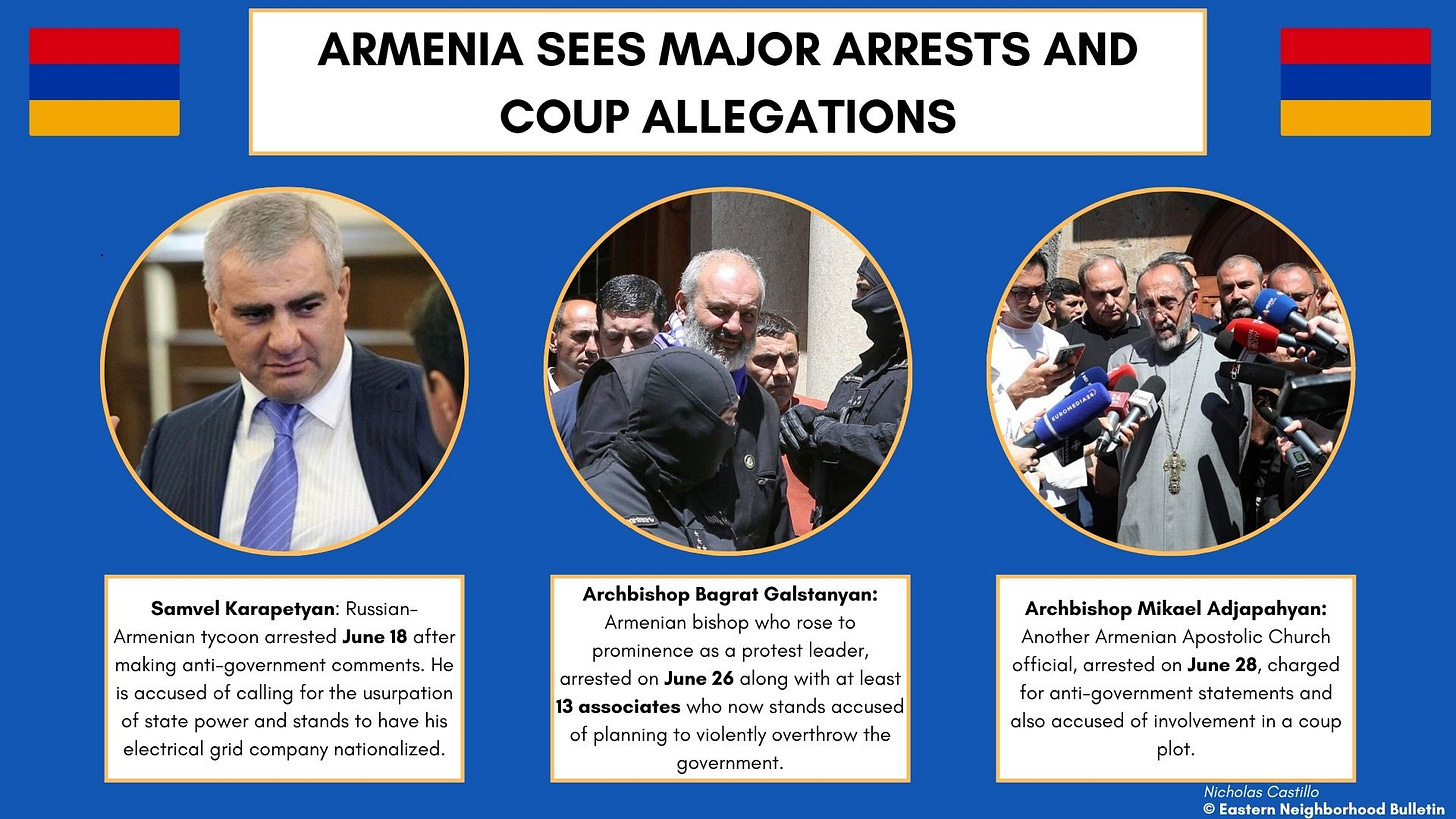Major Arrests and Coup Allegations in Armenia
June was an eventful month in Armenian politics to say the least.
It’s been a fairly wild month in Armenian politics. From the first ever working visit between Turkish and Armenian leaders, to Armenian Prime Minister Nikol Pashinyan offering to show his penis to an Armenian Archbishop, there’s been a lot to keep up with - much of which would seem to have negative ramifications for Armenia’s democracy and stability.
I wanted to bring a rather alarming series of events to the attention of my readers, and also provide a comprehensive list of things to follow in Armenia.
Here are some facts to keep track of:
June 8: Amid an escalating war-of-words and accusations, Armenian Prime Minister Nikol Pashinyan demanded the resignation of the head of the Armenian Apostolic Church, claiming he had violated vows of celibacy, saying “we have returned the government to the people. Now we must also return the church to the people.”
June 18: Armenian authorities arrested the Russian-Armenian billionaire Samvel Karapetyan after he made anti-government comments in response to Pashinyan’s accusations leveled at the Armenian Apostolic Church.
June 24: Pro-Government media outlets began circulating a report claiming that Karapetyan, Armenia’s opposition, and the Armenian Apostolic Church were plotting to violently overthrow the Armenian government.
June 26: Armenian security forces arrested Archbishop Bagrat Galstanyan and at least 13 associates within his “Holy Struggle” movement, charging them with planning “terrorist acts” and a coup. Officials have released photos of weapons reportedly seized from those arrested and secret recordings where Galstanyan and others appear to discuss orchestrating violent protests.
June 27: Another Armenian Archbishop, Mikael Adjapahyan, is arrested on accusations of involvement in a coup plot and for anti-government comments made in early 2024. The arrest prompted minor protests in Yerevan, with demonstrators attempting to block security forces from reaching the archbishop.
All those arrested have been remanded to pre-trial detention.
Armenian officials have released detailed accusations against Galstanyan and his supposed co-conspirators, saying as many as 1000 individuals were recruited as part of a plant to create chaos across Armenia as a core group toppled the government.
The Apostolic Church and opposition political parties have rallied around the arrested men, decrying their arrests as politically motivated.
The church, a center of nationalist life and conservative opinion in Armenia, has been at odds with Pashinyan as far back as the 2020 Nagorno-Karabakh war. Armenia’s loss in that 44-day conflict and the terms of the cease-fire Pashinyan agreed to forced a split between Pashinyan’s Civil Contract party and nationalist elements of Armenian society. The years since have seen Pashinyan take a pragmatic stance toward Azerbaijan and make notable concessions, all without delivering a final peace and normalization treaty with either Baku or Ankara. Such moves have only served to inflame tensions further.
Galstanyan, the bishop arrested on June 26, first rose to prominence in spring of 2024, leading the “Tavush for the Homeland” protest movement, which sought to force Pashinyan’s resignation in response to his decision to transfer Soviet-era exclaves of Azerbaijan in Armenia’s Tavush region back to Baku. While the protests eventually fizzled out, they provided the largest public push-back on Pashinyan’s program to date, potentially heralding greater difficulties for the Civil Contract-led government going forward.
From my perspective at least, it is difficult to know the extent to which accusations against Galstanyan are credible. In response to the release of the photographs of several guns, Galstanyan’s associates simply claim that the firearms are legally owned. Recordings of Galstanyan, which have been reported on as seemingly genuine, do indicate an effort to orchestrate violence, but not necessarily a full coup-plot. Galstanyan would assumedly like nothing more than to have Pashinyan removed from power, having made that the central demand of his protest movement last year, but that does not mean he would go so far as to orchestrate a violent takeover.

Armenian society has seen such turbulence in the past. Pashinyan and pro-Pashinyan media are now claiming that the arrests averted another “October 27,” a reference to 1990s-era massacre of Armenian leaders by nationalist elements.
However, from my view the greatest indication that the charges are politically motivated is the arrest of Karapetyan. The billionaire businessman is charged with inciting the overthrow of the Armenian government based on his statement that “If the politicians fail, we will act in our own way,” in reference to defending the church. Within a few days of his arrest, Pashinyan stated his intention to nationalize Karapetyan’s electrical company, the largest electrical grid provider in Armenia.
That such a clearly politically based arrest took place in the days prior to Galstanyan’s own arrest does strengthen the argument that the detentions of clergymen may have less to do with any attempted coup than with Pashinyan’s own political concerns.
Additionally, the arrests of clergymen comes after a widespread rhetorical assault on the church by Pashinyan and associated elites. The weeks of allegations leveled include accusing prominent priests of breaking vows of celibacy, committing acts of pedophilia, and a claim that the supreme head of the church secretly fathered a child. Pashinyan himself has demanded the resignation of the head of the church, Catholicos Karekin II.
Pashinyan has been under increasing pressure in recent months. His central promise to constituents, that through pragmatic negotiations and abandoning nationalist-irredentist claims, he could deliver Armenia peace, security, and prosperity has yet to bear fruit. Despite making heavy concessions to Azerbaijan, such as announcing he will seek to modify the Armenian constitution and agreeing to eventually remove European Union monitors from Armenia’s de-facto border with Azerbaijan, he has yet to reach a peace deal. Meanwhile, Baku has kept up pressure on Yerevan, sticking by maximalist demands and accusing Armenia of dozens of ceasefire violations.
At home, the governing party also took a notable loss in mayoral elections in Gyumri, Armenia’s second-largest city, where an opposition majority elected a rather notorious former mayor.
For Pashinyan therefore, there is ample reason to see his position as insecure and vulnerable. Armenia will hold national elections in 2026 and likely will also run a nationwide referendum on the question of a new constitution, which Azerbaijan has stated is essential to a final peace agreement.
With recent events however, there would now appear to be a more open question as to the extent Pashinyan will be interested in making those votes free, fair, and transparent.
This story has largly flown under the radar, but as someone whose been monitoring the country for over 2 years, this has been one of the most eventful, potentially pivotal, periods in Armenian politics since September 2023.
That’s all for this this Armenia-news rundown. For regular ENB subscribers, keep a look out for this Thursday’s newsletter!
Best wishes and thank you for reading,
Nick Castillo






